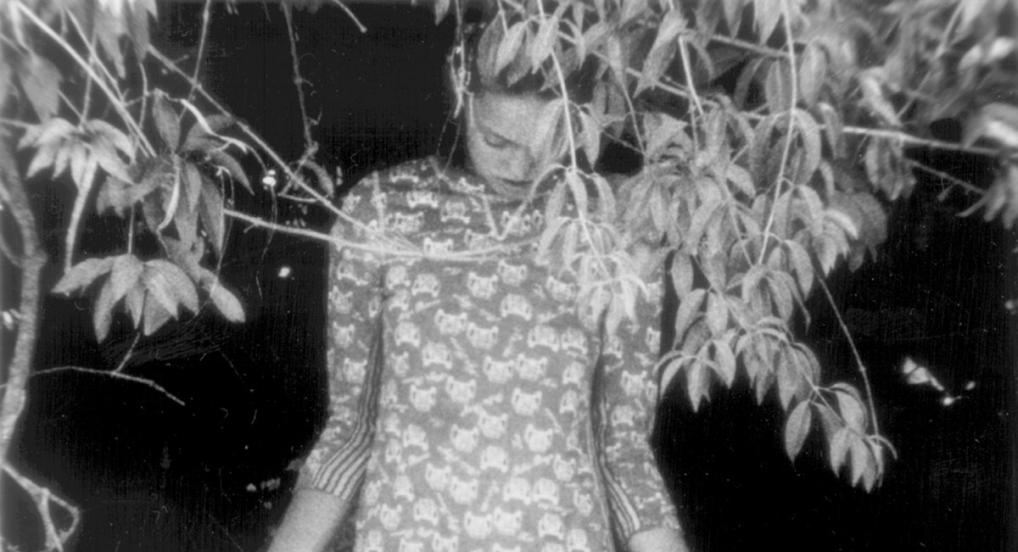For four decades, the reputed American artist Leslie Thornton (1951) has created a complex and penetrating body of films and videos, characterised by constant displacement or by their interstitial positioning. Some traits of a work that resists comfortable classifications are the questioning of borders and the overlapping between resources and supports; the continual exploration of the possibilities afforded by changing technology; critical investigation into notions of narration and representation; interrogation of the closed or completed work and, consequently, postponement of its semiotic closure. In fact, many of her pieces are conceived as series of episodes in constant development and have been re-made and re-structured over the decades, as is the case of the classic Peggy and Fred in Hell (1984-2015) —a milestone in contemporary experimental cinema— or The Great Invisible (2002-), both presented here in their most recent version.
Underlining these slips and instabilities, this retrospective —the first dedicated to her in Spain— proposes a partial approach to her work from the perspective of uncertainty. Hesitation is assumed here as a spectator’s position —unusual and disturbing, but highly suggestive— and also as an epistemological posture towards the world around us and its imagery. In this regard, it is worth noting how the work of Leslie Thornton, which began in the cinematographic sector in the company of noteworthy experimental artists such as Stan Brakhage, Paul Sharits and Hollis Frampton, may be positioned in a line that emanates avant-garde tradition and tracks the changes in direction of structural film towards the new narration of the 70s and 80s. We do, in her case, come up against narrations full of hiatuses where representational conventions are subject to firm interrogation using mechanisms such as fragmentation, the juxtaposition of images and of sounds and the decontextualisation and relocation of voices, figures, objects and disparate archive materials. Thus, when the artist adopts generic narrative forms, such as science fiction (Peggy and Fred in Hell), biographies (The Great Invisible), historic tales (Let Me Count The Ways; They Were Just People,) or travel journals (Philosophers Walk on the Sublime), these forms may be considered devices that, although they allow us enter territories or codes that are a priori familiar, soon acquire a strangeness that is as unusual as it is fascinating. Her works often convey the sensation that characters and figures are wandering in a universe of signs of a contradictory nature; signs that they have to face (and we with them) to be readable subjects, to question their own readability in subjective and social terms; and even to lend meaning to the cultural context in which they are set. Whether it be the adolescent Peggy singing verses of Michael Jackson’s song, Billie Jean (and her disconcerting “be careful what you do, because the lie becomes the truth”); the little Jennifer whose gestures challenge the masculine voiceover that calls her authoritatively as she plays mischievously with a match (Jennifer, Where Are You?); Saharan women represented on vintage erotic postcards that are spread out over low-quality images of modern-day Hollywood (Sahara/Mojave); or the film maker herself faced with a traumatic historic past such as the bombing of Hiroshima from a partially autobiographical perspective (Let me Count the Ways) or the experience of understanding an absolute and evasive dimension such as the sublime (Philosophers Walk on the Sublime).It is in the hybridisation, in the multi-layer quality of her works and in the gaps between these layers that the limitless nature of her films lies —that continual re-visiting that the film maker herself vindicates as artistic praxis—, and also the questioning of our certainties, often with the desire to break cultural practices that perpetuate stereotyping.
Thus, from a thematic point of view, the pieces that make up the season and that cover a wide time spectrum —including both her first works and a fragment of an as yet unfinished piece, They were just people (2016)—provoke meditation on important social discourses that circulate in the public sphere. The central concerns running through Thornton’s works selected here are the conception of identity as flow; reflections on cultural otherness emphasising the central role that femininity and sexuality occupy in the articulation of colonial imaginations and the conception of what is exotic; the role of technology in our lives; and the weight of history and the ways of negotiating with and tackling the violent wounds of the past. All without forgetting, or without displacing, as suggested by the title, the ways in which her artistic practices interweave aesthetic aspects into a wider ideological and technological network, so that their most immediate quality, beauty, is equally subject to investigation and, at times, refutations. It is not in vain that even Thornton has defined herself as a hardcore experimentalist.
Programme curated & Text by Elena Oroz.
As part of the 57th ZINEBI Bilbao International Festival of Documentary and Short Film.
Programme:
Sunday November 15, 17:30h Programme 1: - Binocular Menagerie (Leslie Thornton, 2014, 3') - Jennifer, Where Are You? (Leslie Thornton, 1981, 11') - Let Me Count The Ways: Minus 10, Minus 9, Minus 8 And Minus 7 (Leslie Thornton, 2004, 20') - Philosophers Walk On The Sublime (Leslie Thornton, 2013, 17') - They Were Just People (An excerpt) (Leslie Thornton, 2015, 10') - X-Tracts (Leslie Thornton, 1975, 9')
Tuesday November 17, 17:30h Programme 2: - Peggy And Fred In Hell (Leslie Thornton, 2013, 91‘)
Wednesday November 18, 17:30h Programme 3: - Adynata (Leslie Thornton, 1983, 30') - Another Worldy (Leslie Thornton, 1999, 23') - Oh, China, Oh! (Leslie Thornton, 1983, 3') - Sahara/Mojave (Leslie Thornton, 2006, 12')
Thursday November 19, 20h Programme 4: - The Great Invisible: Evolving (Leslie Thornton, 2015, 75')
